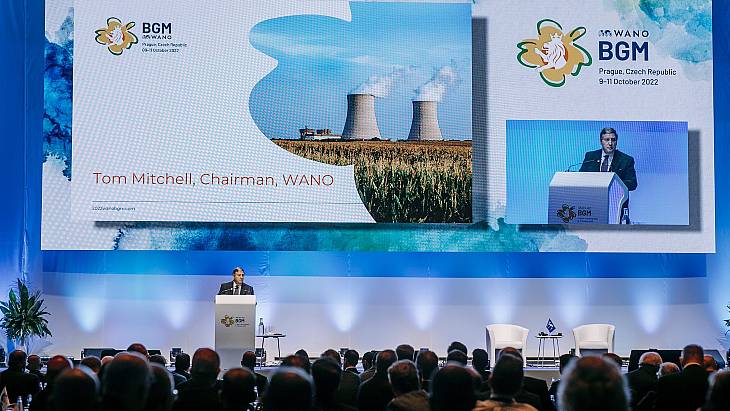It is now more than three decades since WANO was created with a mission "to maximise the safety and reliability of nuclear power plants worldwide" and Mitchell and Chigusa are determined that it will continue to fulfil that function, with a wave of new entrants to the industry expected in the years ahead.
In an interview with World Nuclear News, they stressed the introduction of a new category of member (category 5), for those who do not yet have operating reactors (with WANO, each reactor is individually a member).
The organisation carries out peer reviews, where experts from various member countries and companies visit other members to advise on safety and best practice. With new nuclear, the focus is on helping organisations move from the construction phase into the operation phase successfully, "which is not a simple thing".
Mitchell says: "As soon as an organisation decides they are going to build a plant, they should become a category 5 member because for a small investment they will gain a lot of knowledge - the sooner they are acclimated to what we’re doing and become part of what we call a community, they gain the most and by the time we get to the pre-startup peer review, they are in pretty good shape."
And it does seem like there is likely to be a big number of new entrants to the sector, from countries developing their first nuclear power plants, to the dozens of small modular reactor developers and operators.
Mitchell, who stresses that WANO is a safety-focused organisation that does not seek to advocate the case for nuclear, says that his personal view is that "this is a very exciting time ... you know there is no credible way to deal with the climate change issue, the rapid decarbonisation, without nuclear. I’m not saying that nuclear is the only way to achieve this, there needs to be a mix".
"Nuclear has a key and essential role in achieving this. We have to maintain this option - maintaining this option means we have to operate these plants safely and reliably, maintain public confidence in the technology and we need to be ready for potentially a whole new set of players who may not have that 45 years of experience that OPG has or others, who want to become part of this and be successful because I do believe that we are all in this together."
Chigusa, who took over as CEO at the start of the year, has more than 40 years' experience in the nuclear industry, and will certainly have plenty to do in his new role - as well as the expanding membership numbers, there is a new Shanghai centre to add to WANO's existing regional centres in Paris, Moscow, Atlanta and Tokyo.
He comes to the post after eight years as director general of WANO's Tokyo centre, where he played a key role in piloting the Action for Excellence initiative which sees a lot more contact and on-going support for members on top of the peer-review missions that have been traditional.
Chigusa says that as WANO CEO he can continue that work and take his fieldwork "into the global organisation" and bring it into the "implementation stage without losing any momentum". He says WANO must be "visionary leaders" in its key areas, wanting to "embed" its nuclear safety philosophy into newcomers.
He also aims to spread his motto of harmony based on the first article of Japan’s 604AD constitution - uniting minds, understanding different interests and combining forces in one direction. Mitchell says the organisation is excited to have a different and fresh cultural perspective for what is a multinational and multicultural global organisation.
One area is developing the language options for the organisation and members - English is its official language but better tools are being developed to avoid language issues, and to ensure WANO is not English-, or Western-, centric. Mitchell says that while executives might well have English at a high level, there are many people involved in key roles in operations who may not.
Another development is the transitioning of the Shanghai office from a supporting role to a regional centre, under Director Chen Hua, who has previously served as a WANO governor at the Tokyo centre’s regional governing board. There is also some continuity with the appointment of Kim Keeyoung - previously at KHNP and a previous deputy director secondee at the WANO Tokyo centre - as Chigusa’s successor as director general of the Tokyo centre.
Meanwhile attention continues to be focused on what can be done to help amid the on-going war in Ukraine, which has seen one of its member nuclear power plants occupied by the military of another of its members.
The organisation seeks to focus on safety issues and is non-political, and does not have the diplomatic capability of the International Atomic Energy Agency (IAEA) "to have boots on the ground". This has led to a two-pronged approach, of supporting and collaborating with the IAEA’s efforts, and seeking to support the plant operators in Ukraine, including a recent mission carried out virtually.
"Our mantra has always been that we are here to support the operators … we don’t want any power plant to become isolated, we are all part of a community and I think we all agree that our mission is nuclear safety and we don’t think it would be in the interest of nuclear safety for any organisation or plant to become isolated. We’re going to support all of our members, try to find creative ways to accommodate the situation and not letting any group or organisation become separated," Mitchell said.













